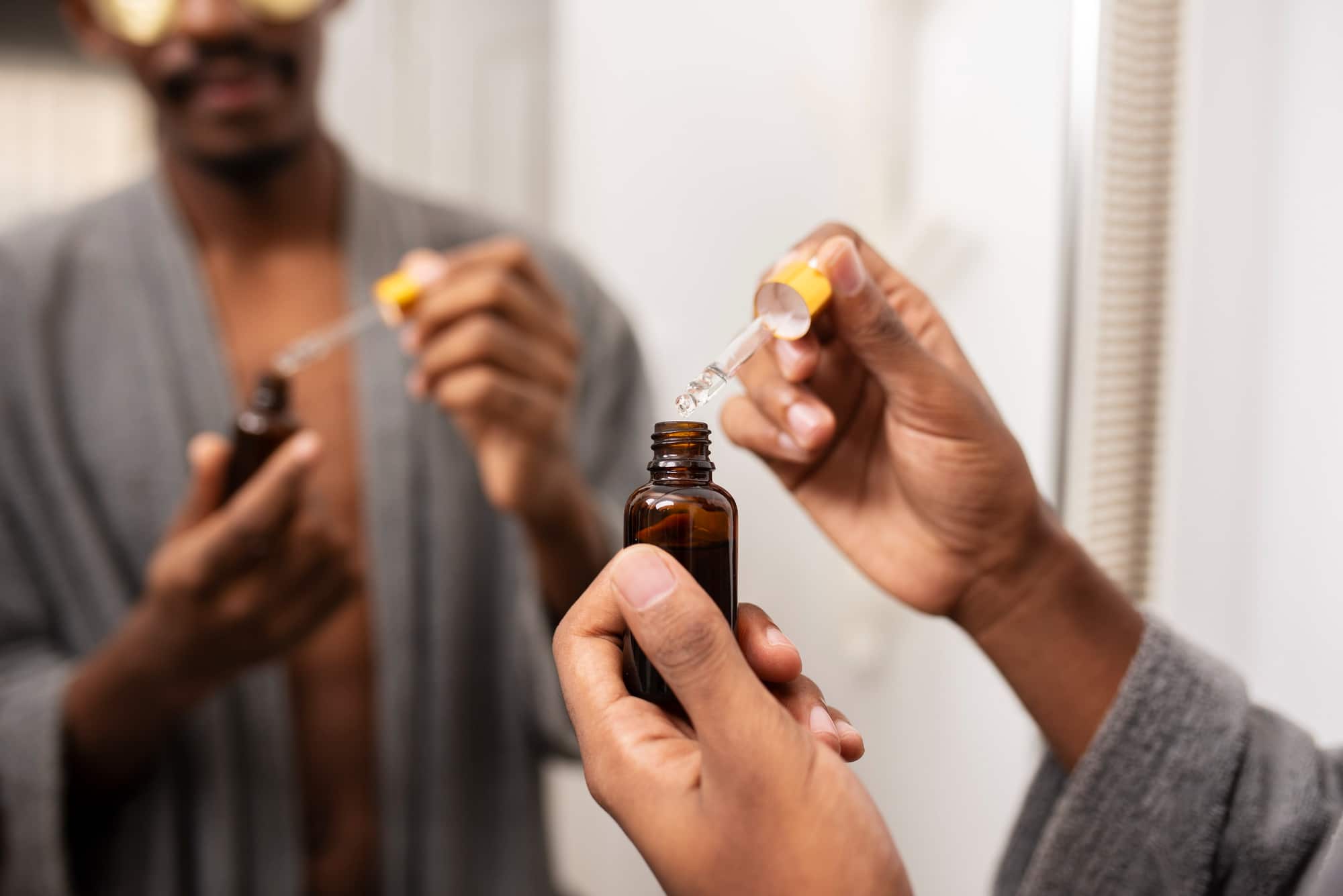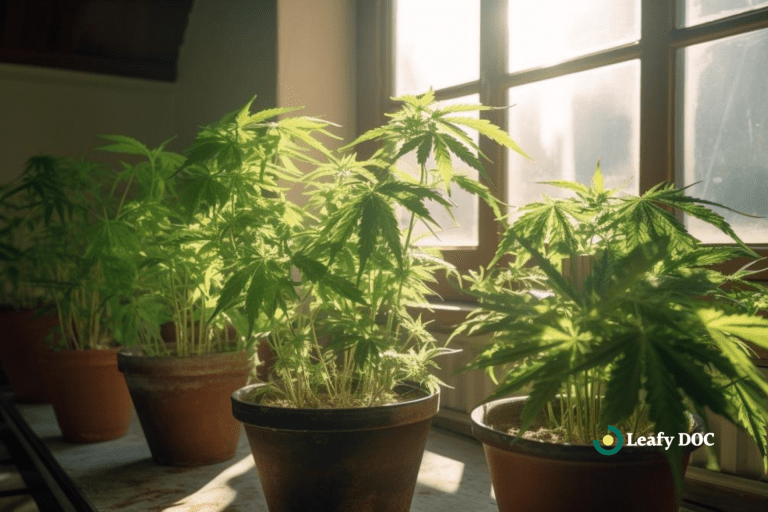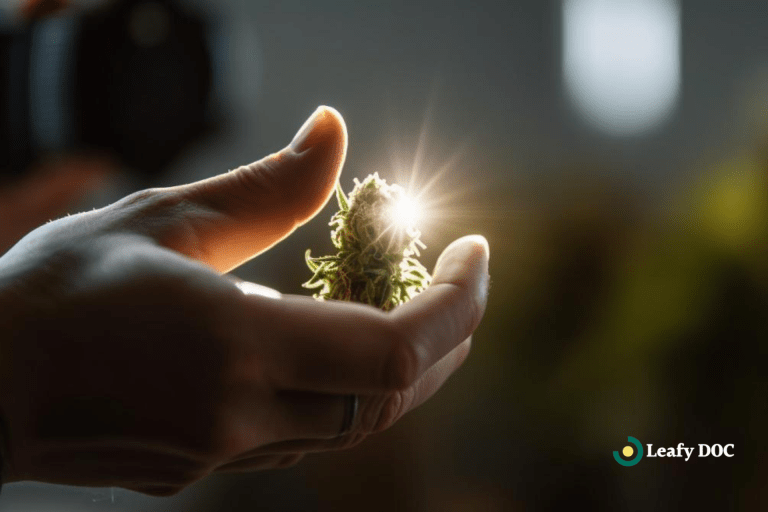The Link Between CBD and Testosterone Levels
by Haley Mills · February 24, 2023
Discover the potential benefits of adding CBD to your daily routine to help support healthy testosterone levels. Learn how it can help you achieve and maintain optimal health from experts in the field.

The question about CBD’s effects on testosterone and other hormones is a frequently asked question among the cannabis community. If you are wondering if medical marijuana can potentially help balance certain hormones, read below to learn more.
What is CBD?
Cannabidiol CBD is a chemical found in marijuana, and the cannabis plant is used to manage various health conditions such as inflammatory and neuropathic pain. CBD is a cannabinoid found in marijuana, hemp, and the Cannabis Sativa plant.
Hemp-derived CBD products do not contain THC, the chemical in marijuana that causes psychoactive effects referred to as a high. However, some CBD products are derivatives of marijuana and contain small amounts of THC.
CBD manages many health conditions, from skin irritation to neurodegenerative disease. More research is constantly being done to learn more about CBD and its benefits for the human body.
Hemp-derived CBD oil
Hemp oil has a higher CBD content than marijuana, and many products on the market contain hemp-derived CBD rather than marijuana-derived CBD products. Hemp seed oil comes from the Cannabis Sativa family and has long been used to make clothing, paper, and cloth for medical purposes.
Cannabis-derived CBD oil
CBD is found in all strains of cannabis, both Indica, and Sativa. Marijuana contains a much higher THC content than hemp and contains other chemicals that can aid and bolster the effects when you extract CBD. Cannabis plants also have higher levels than hemp plants.
The CBD molecule is the same regardless of where it is derived from; however, cannabis-based CBD products can contain higher levels of THC than the 0.3% hemp products have.
How to Ensure CBD Products Have Been Tested by a Third-Party Lab?
Always look for a Certificate of Analysis (COA) when buying CBD. This report confirms that the product was tested by an independent lab for quality, potency, safety, and legal THC levels. Reputable brands usually provide COAs on their websites, often linked to each product batch. Checking this document—and customer reviews—helps ensure you’re getting a safe and trustworthy CBD product.
What is testosterone?
Testosterone is a hormone naturally made in the body’s main sex organs. The beginning of testosterone production begins during puberty and continues through adult life. As humans age, the production of these hormones slows down around age thirty. Although this is a natural occurrence, this hormone reduction can impact the body in various ways.
The brain and pituitary gland control the body’s testosterone production and distribution. It is related to sex drive and sperm production in men. It also plays a role in bone and muscle development, growth, and maintenance, fat storage, and blood cell production.
How important is testosterone in the body?
Testosterone plays a vital role in male and female health. It helps to regulate libido, muscle mass/strength, bone mass, and distribution of essential fatty acids in the human body. Testosterone levels also contributes to sperm and red blood cell production in men.
Cannabidiol and the ECS
CBD doesn’t produce the same psychoactive effect on most people as THC. There isn’t a mental state of euphoria or intoxicated feeling as CBD does not interact with the CB1 and CB2 cannabinoid receptors in the brain that THC and other cannabinoids do.
Instead, CBD induces the brain’s endocannabinoid system (ECS) to create more natural cannabinoids and then slows down the chemical breakdown in the brain. This is how cbd affects testosterone and influences the male reproductive system.
CBD works as a natural pain suppressant and increases the activity of serotonin receptors in the brain. This increased activity positively affects pain and reduces anxiety disorders, stress, depression, sleep disorders, and obesity, among other things.
The ECS works alongside the hypothalamic-pituitary-adrenal (HPA) axis to support testosterone production in the Leydig cells of the testis. Chronic stress can lower testosterone levels, but CBD’s natural anxiolytic effects may help reduce emotional stress and promote hormonal balance. Some studies suggest CBD may benefit those with social or general anxiety, indirectly supporting testosterone levels and overall reproductive health.
The endocannabinoid system regulates learning and memory, emotional processing, sleep, temperature control, pain control, inflammatory and immune responses, and eating. This vital system is currently at the center of renewed international research and drug development.
Research suggests it is reasonably safe and is well tolerated at doses up to 1,500 mg with little to no negative consequences or risk of substance abuse. While heavy marijuana use can lead to dependence, current preclinical studies suggest that CBD is not an addictive substance, nor does it promote addictive behaviors in people. The World Health Organization has concluded that CBD exhibits no effects that indicate abuse or dependence potential in humans.
Causes & Symptoms of Low Testosterone
Low testosterone, aka male hypogonadism, can be caused by the following:
- Aging
- Alcohol Abuse
- Testes injury or infection
- Metabolic disorders
- Steroids, opioids, or prostate cancer medications
- Pituitary gland dysfunctions
- Liver cirrhosis
- Sarcoidosis
- Sleep apnea
- Obesity
- Significant weight loss
Symptoms of low testosterone may include:
- Fatigue
- Mood Swings
- Low Libido
- Loss of lean muscle mass
- Depression
- Irritability
- Erectile dysfunction
Utilizing CBD to Raise Testosterone Levels
Cannabis can be used in various ways depending on the individual’s preference and desired effects. Here are the four primary ways to use CBD products. Recent data suggest cannabinoids may interfere directly in Leydig cells with protein and testosterone synthesis to regulate their functions and help the body produce testosterone.
Ingestion
CBD can be consumed in the form of drops, capsules, tinctures, or edibles like gummies and drinks. Since the digestive system slows absorption, effects may take 1.5 to 4 hours to appear. Bioavailability ranges from 6–20%, but this method offers longer-lasting results.
Inhalation
Inhaling CBD through vaping or smoking provides the fastest onset—effects can appear in under 5 minutes, with bioavailability up to 45%. Be sure to use products intended for inhalation and always follow product safety labels.
Sublingual
Placing CBD oil or tincture under the tongue allows it to absorb quickly through the mucous membranes. Effects typically begin within 15 minutes and can last 2–8 hours, offering a balance between speed and duration.
Topical
CBD-infused creams, salves, or patches can be applied directly to the skin for localized relief. While effective for pain or inflammation, topicals are not ideal for supporting testosterone levels, as they don’t offer systemic absorption.
Legal Considerations When Buying CBD Products
While CBD is federally legal in the U.S., state and local laws can vary. Some areas require sellers to have special licenses, so always buy from a supplier with proper business credentials. Choose hemp-derived CBD products, as they contain little to no THC—reducing the risk of psychoactive effects or a failed drug test. Finally, make sure the product comes with third-party lab test results to verify its legality, safety, and potency.
How Does the Bioavailability of CBD Differ Between Inhalation, Ingestion, and Sublingual Use?
CBD’s effectiveness depends heavily on how it’s taken—this is known as bioavailability.
- Inhalation (vaping or smoking) delivers the fastest results, with effects in 5 minutes and up to 45% absorption into the bloodstream.
- Ingestion (edibles or capsules) has the lowest bioavailability—around 6–20%—because CBD is broken down during digestion. Effects can take 1.5 to 4 hours.
- Sublingual use (under-the-tongue oils or tinctures) offers a balance: faster than edibles, with effects in 15 minutes and lasting 2–8 hours.
Each method offers a different balance of speed, duration, and absorption depending on your needs.
What to Consider When Choosing a Trusted CBD Supplier
Choose a trusted CBD supplier by checking a few key things:
Make sure they source their CBD from reputable farms and provide a Certificate of Analysis proving third-party lab testing. Look for products labeled as hemp-derived CBD if you want to avoid THC content, and confirm the brand follows local regulations. Always review product potency and read customer feedback to assess quality and reliability.
Other Hormones Affected by Cannabinoids
While CBD can interact with testosterone, that’s not the only hormone this cannabinoid can affect. Let’s explore others ways this powerful cannabinoid can play a role other than with the body’s testosterone levels.
Thyroid Hormone
Endocannabinoids encourage the storage of energy by lowering thyroid hormone levels. CBD interacts with thyroid hormones by decreasing or increasing them depending on your thyroid’s overall health.
Research suggests that anandamide suppresses these hormones in ordinary and hypothyroid conditions and not in hyperthyroid states. This may prove that CBD and endocannabinoids have adaptable properties, helping to balance homeostasis according to the individual.
Estrogen
Estrogen influences sexual development, fertility, and susceptibility to diseases such as breast cancer. Studies found that CBD suppresses estrogen production by blocking an enzyme that converts testosterone into it. Aromatase blockers lower estrogen levels in post-menopause and breast cancer patients. CBD can speed up the breakdown of estrogen by acting on p450 enzymes in the liver.
Insulin
Insulin is a critical hormone in regulating metabolic health. It has a significant effect on energy and weight. CBD was recently proven to have the ability to help patients with diabetes reduce insulin levels and maintain blood sugar levels. A 2018 study suggested that daily cannabis users have sixteen percent lower fasting insulin levels than non-users.
Growth Hormone
Growth hormones regulate the regeneration and reproduction of cells for healthy growth and development.
Growth hormones contribute to :
- Burning Fat
- Energy levels
- Muscle mass
- Exercise capacity
- Bone Strength
- Reducing Weight Gain
CBD hasn’t been shown to affect growth hormones; however, THC has been demonstrated to lower growth hormone levels in some people.
Cortisol
CBD has stress-relieving properties that can significantly benefit the body’s stress hormone, aka cortisol. It helps the stress response by influencing GABA neurotransmitters to slow down the nervous system. It can also affect cannabinoid receptors in the hypothalamus, slowing cortisol release and promoting relaxation. Studies have proven that CBD modulates cortisol release, which is why anxiety is a primary qualifying condition for MMJ.
7 Best CBD products for Hormone Control
- Lazarus Naturals Full Spectrum High Potency CBD Oil Tincture
- Charlotte’s Web CBD Oil: 60mg CBD/1mL
- Elixinol Good Mood CBD Gummies
- Ned Hormone Balance Blend Oil
- Brown Girl Jane Balance
- Empower Bodycare CBD-Infused Soaking Salts
- Calm by Wellness CBD Lavender Lotion
How long does it take CBD to kick in?
CBD can take at least thirty minutes to kick in, sometimes an hour if taken in edible form. It can also take a few weeks to start feeling significant benefits. The right dose of CBD oil depends on many things. The product and level of CBD contained, and the tolerance and experience of the individual are all critical factors. Many people think CBD cures cancer when it in fact helps with symptoms.
A person’s weight and body chemistry also play a role. It is always best to start small to see how your body reacts to a CBD product and reduce anxiety around trying something new. Smaller doses start around 20 mg of CBD daily and increase higher doses.
Our Key Takeaways on CBD & Testosterone
CBD may not directly increase testosterone, but it can support hormonal balance by interacting with the body’s endocannabinoid system (ECS). The ECS plays a key role in maintaining homeostasis, and when influenced by CBD, it may indirectly aid testosterone production.
CBD is also known to reduce stress and improve sleep—two factors that help maintain healthy hormone levels. Unlike THC, which may lower testosterone when used excessively, CBD’s effects tend to support overall well-being. Additionally, CBD may improve metabolic health, reduce inflammation, and enhance testicular function, further contributing to hormonal balance.
Since extreme stress and anxiety can lower testosterone levels, CBD’s natural anxiolytic effects may help manage these triggers and promote hormonal balance. Some studies even suggest that CBD could support treatment for social and general anxiety disorders. By lowering stress levels, CBD may indirectly help maintain or boost testosterone production, offering both mental and hormonal benefits.
Last Updated: May 19, 2025
Get Approved for Your Medical Marijuana Card in Minutes!

Get Your Medical Card
Connect with a licensed physician online in minutes

Like This Article?
Share with your friends
Table of Contents
Keep Reading
-
A Guide To Growing Your Own Medical Cannabis
Take control of your healing journey and grow your own medical cannabis at home with this comprehensive guide. Learn how to cultivate and nurture your plants for optimal results. Start growing medical cannabis today!
-
How Long Does Weed Stay In Your Blood
Curious about how long weed stays in your blood? Get the truth and debunk myths in this eye-opening article. Click now for all the facts you need!
-
Understanding Cannabis Dosing Guidelines: Finding The Right Amount
Uncover the secrets to perfect cannabis dosing with our comprehensive guide on understanding cannabis dosing guidelines. Find your ideal dose and enhance your experience today!



